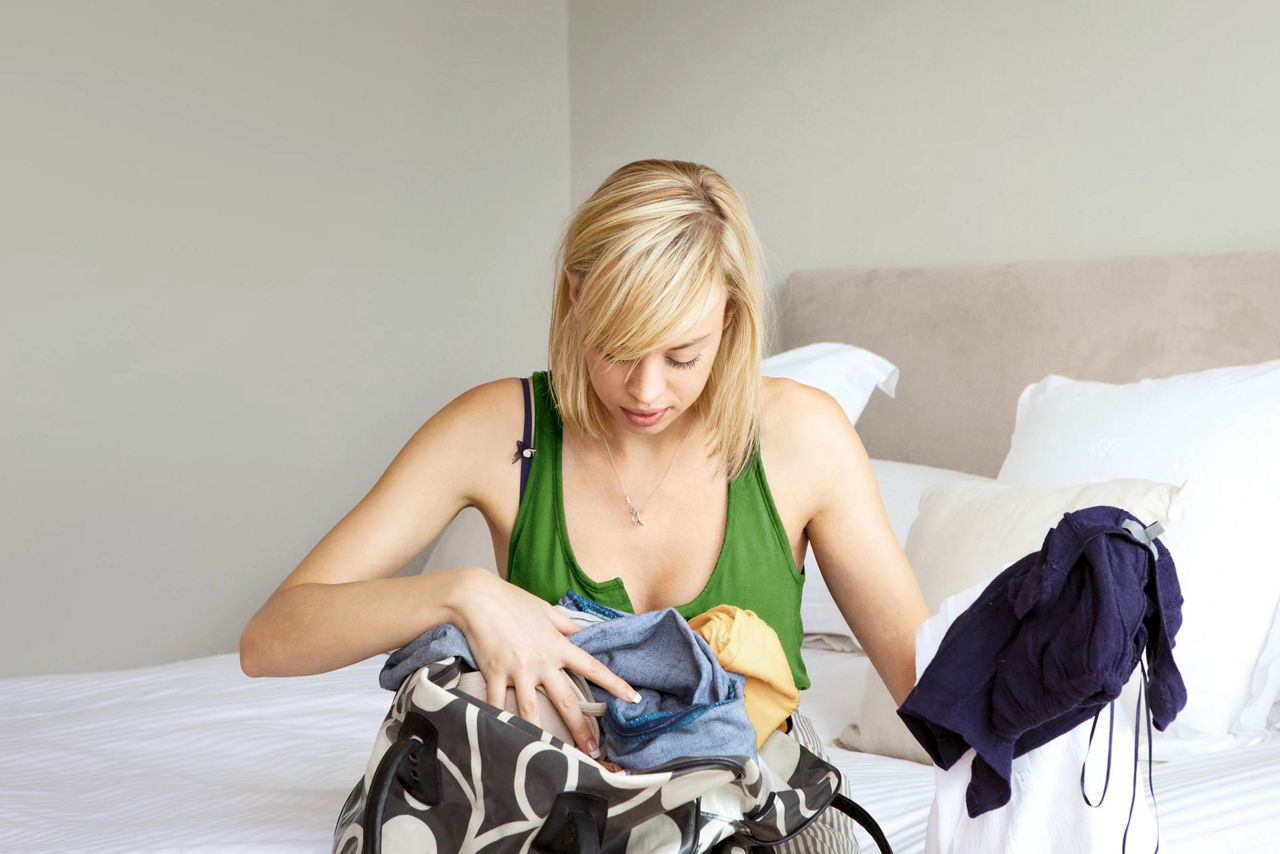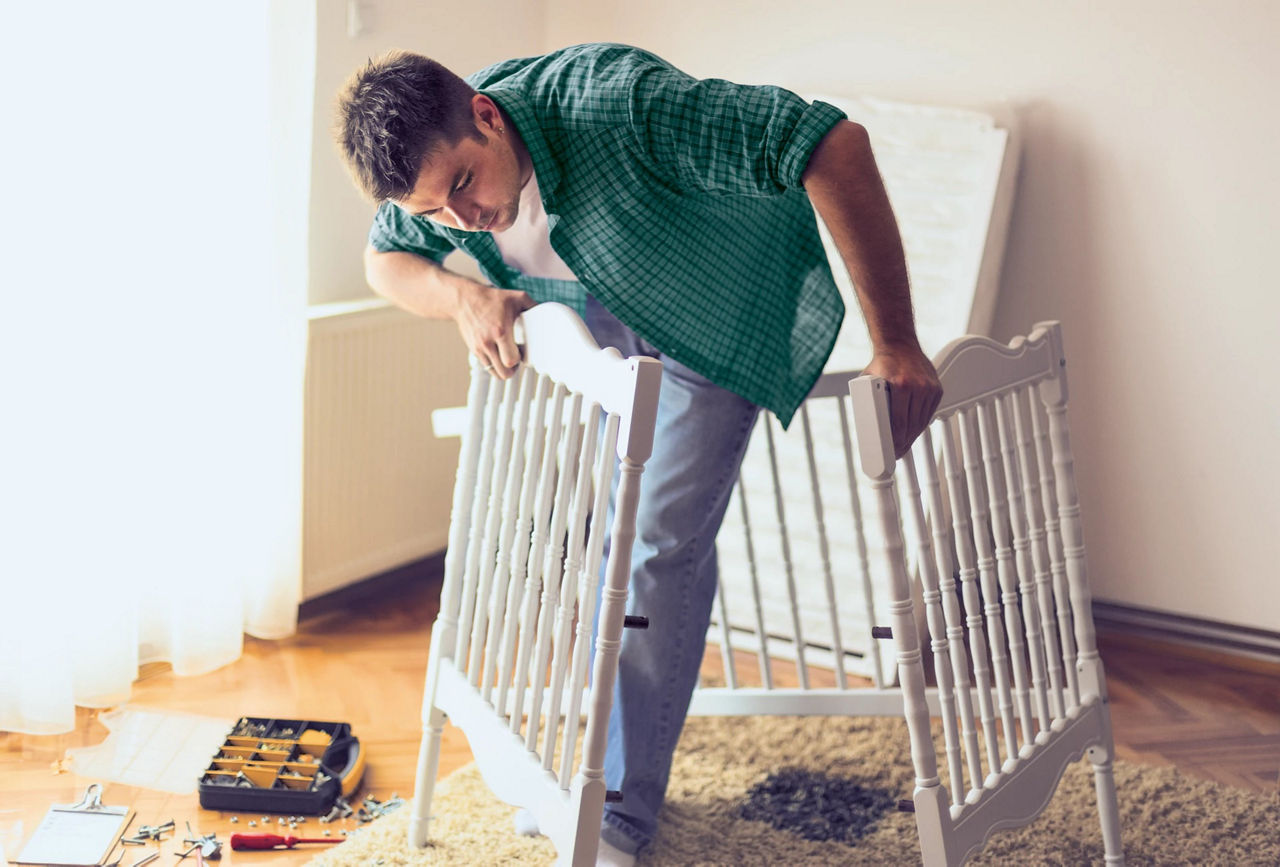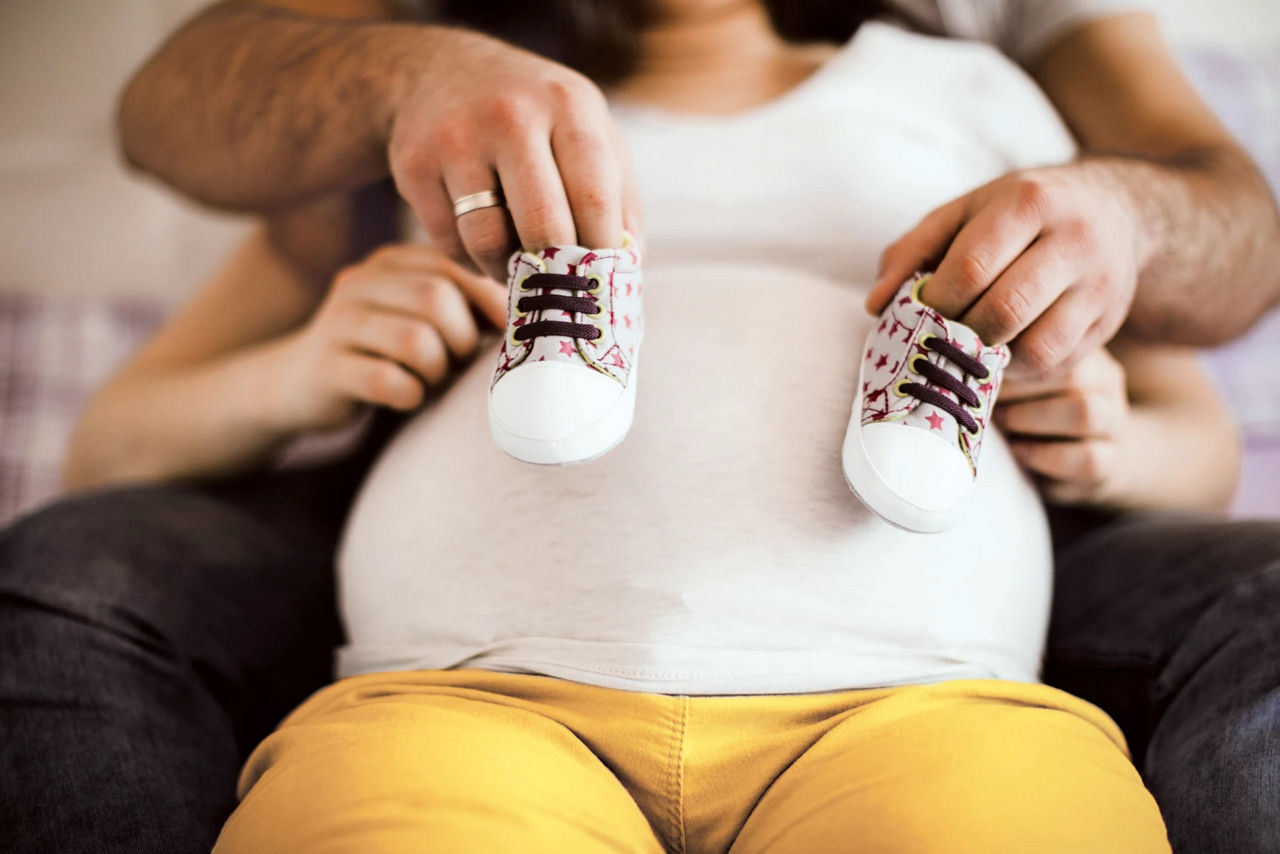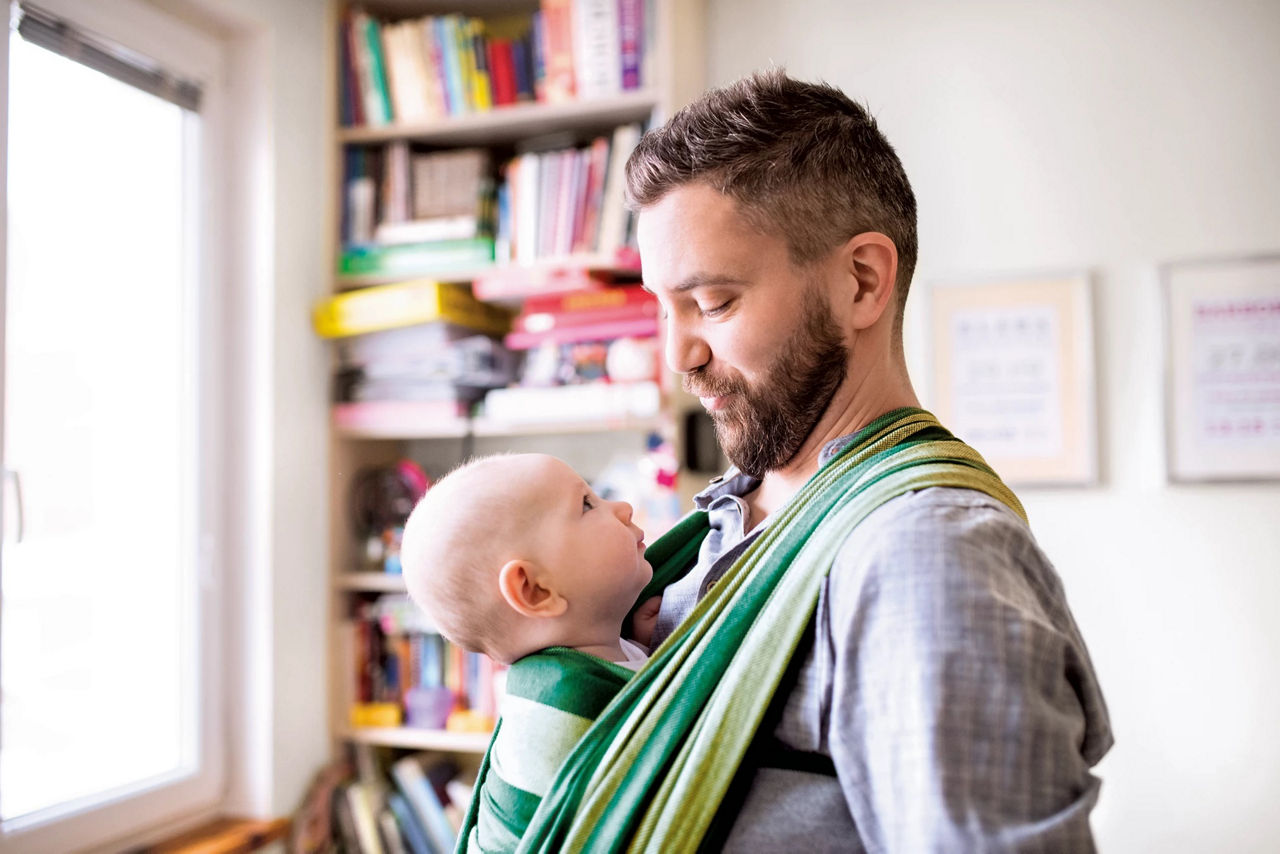Free weaning plan - Register here
Your hospital bag checklist: get ready for action stations!

Wondering what to pack in your hospital bag? We’ve got you covered.
From new-mum must-haves to new baby essentials, our hospital bag checklist will help you get prepared and ready for labour in no time.
When to pack your hospital bag
Aim to have your hospital bag packed around three weeks before your due date. If you’re having twins, you might want to do this earlier - from around 26 weeks1.
Get ready, set, baby, with our must-have hospital bag checklist.
Or view the mobile friendly checklist here
Hospital bag essentials for Mum: packed, prepared and ready for anything!
When it comes to birth and babies, every parent’s experience is unique. Our advice? Always prepare for the unexpected!
When packing your hospital bag, think about:
- How long you might be in hospital - your stay will be a little longer if you have a C-section.
- What type of birth are you planning? If you’re hoping for a water baby, a tank top or bikini would be great for a water birth.
- If you’re planning a home birth, having a hospital bag packed and ready to go will be a real help if you change your mind during labour or need to transfer to the hospital.
The practical bits for your labour bag
- Your pregnancy paperwork and birth plan if you've chosen to make one.
- Nursing bras and breast pads.
- Maternity pads.
- Maternity knickers - the bigger, the better! Big pants jokes aside, high-waisted cotton knickers will be comfy and sit above your scar if you’ve had a C-section.
- A few pairs of front-opening PJs or nighties (ideal for breastfeeding), a comfy dressing gown and slippers. Flip-flops are also handy for after the shower.
- TENS machine for pain relief during earlier stages of labour, and spare batteries just in case. Be sure to speak with your midwife before you use a TENS machine, as they’ll be able to give you the correct advice about how to use it2.
- Mobile phone and a charger so you can get snap-happy taking pictures of those first magical moments.
- Headphones and speakers. We’re not suggesting parties in the maternity ward, but listening to some soothing music or your favourite tunes can help you feel relaxed. Why not have a go at creating a playlist for labour?
- Water bottle - giving birth can be thirsty work! Choose a bottle with a sports cap or straw. You don’t need to be messing around with screw lids when you're in labour.
- A hair tie or bobble. The last thing you need is your hair in your face once your contractions start.
- Lip balm. So many mums tell us that this was an absolute must-have during labour. For those using gas and air, this might leave your lips feeling a little dehydrated.
- A few snacks and drinks to keep you going! Cereal bars, bananas and toast are all great options.
Download your essential hospital bag checklist, and let’s get packing!
Or view the mobile friendly checklist here
Make yourself comfortable
Whilst your new arrival might be the star of the show, you’re also a very important person (aka VIP) when it comes to your labour and birth.
Our checklist includes a few essentials to keep you calm and comfy:
- Shampoo, conditioner, and body wash for that refreshing post-birth shower.
- Deodorant.
- Body lotion and hand cream. Hospitals can get a tad warm; hand and body lotion can help to prevent your skin from drying out.
- Ear plugs and an eye mask are great ways to get some well-deserved rest on the maternity ward.
- A pillow - there’s nothing quite like your own from home.
- Comfy clothes for the journey home.
When it comes to home comforts, I don’t think I’ve ever tasted anything as good as the post-birth tea and toast given to me by the midwife in hospital. It felt like a meal fit for a champion!’
Sylvie’s mum
Perfect hacks to help you pack
‘When I started my maternity leave, I prepared and froze some family favourites before my little one arrived. I’d really recommend this. It means you’ll have some delicious, no-fuss, home-cooked food to enjoy in the first few days when you may be too tired to cook.’ Logan’s mum | ‘I went with my partner to choose our baby’s coming home outfit. It helped make things feel real, and we started to feel really excited about our baby’s arrival!’ George’s mum |
‘There’s a temptation to spend lots of money on things you don’t need when expecting a baby. I borrowed my hospital bag from a friend and made use of all the nearly-new baby clothes I’d been given. This can be a Godsend, especially if you’re on a budget. It’s also environmentally friendly too!’ Daisy’s Mum | ‘I invested in a hand-held fan with a water-spray function. It was such a welcome relief and kept me nice and cool during my labour.’ Sam’s Mum
|
“Here’s my hack for packing your baby’s newborn outfits in your hospital bag: bundle them up into separate sets, including a baby grow, vest, scratch mittens and a hat and put each set in a sandwich bag. My husband found it so much easier to find things as soon as our daughter was born and saved him rummaging around in my massive bag. Finding one of those tiny hats would have been impossible if they were loose!” Farrrah’s mum.
| |
Hospital bag checklist for your baby: what to pack for your new arrival
Discover our newborn baby checklist
For hospital
From staying snug to changing and feeding, our hospital bag checklist has got you covered:
- Vests, baby grows, sleepsuits, hats and scratch mittens. Pack around 3 separate outfits.
- Nappies and alcohol/fragrance-free baby wipes or cotton wool. Be sure to pack plenty, as you might have to change your baby up to 12 times a day3!
- Muslin squares - your new best friend when feeding (and winding) your baby.
For the journey home
It’s time to head home with your baby. Here’s your newborn baby checklist for a safe and happy trip:
- A baby car seat that’s fitted correctly and suitable for newborns.
- A going-home outfit. If your little one arrives in winter, be sure to check the weather and bring something warm and cosy.
- A baby blanket - to keep your baby snug on the drive.
💡Top tip: car seat safety
Practice fitting the car seat and taking it in and out of your car before your baby is born. That way, you’ll be ready to go when it’s time to head home.
Planning a C-section? Theextras you might need for your hospital bag
If you’ve opted for a C-section or been advised that this is the best option for you, there are a few additional things that will come in handy during your stay in the hospital:
- High-waisted knickers that will go over your scar.
- Loose, comfortable clothing that doesn’t cling or aggravate your scar. Front-opening tops and nighties are great; you don’t need to take them on and off when breastfeeding.
- Shoes that slip easily on and off, so you don’t have to bend down.
- Cleansing wipes and hand sanitiser can make feeling fresh a little easier.
- Your tablet and some books and magazines. There could be a fair amount of waiting around, so take the opportunity to binge your favourite boxset whilst you can.
💡Top tip: preparing for a C-section
Even if you haven’t planned to have a C-section, it may be that this ends up being the best thing for you and your baby to ensure a safe arrival.
Be sure to pack plenty of everything. If you run out of room, why not pack another bag for your birth partner to keep on standby, just in case you need it? You could use a sandwich bag to pack a vest, hat, mittens and sleepsuit and keep it on top of your bigger hospital bag. Then it will be easy to find if you need to head to theatre or need those baby essentials in a hurry.
The ultimate hospitable bag checklist for your birth partner (don’t forget the snacks…)
Whoever you choose to have by your side, whether it’s baby’s dad, your partner, a friend or family member, make sure your birthing partner is prepared to support you at every step with our must-have hospitable bag checklist.
When it comes to home comforts, I don’t think I’ve ever tasted anything as good as the post-birth tea and toast given to me by the midwife in hospital. It felt like a meal fit for a champion!’
Sylvie’s mum
If you’re planning to be someone’s birthing partner, here are a few things to include in your very own hospital bag:
- Snacks - it’s not just mum who needs to keep her energy up.
- Water. Opt for a water bottle with a sports cap to avoid spills.
- A change of clothes and some essential toiletries, such as your toothbrush and toothpaste, just in case things take a little longer than expected.
- Magazines, books or your tablet. Labour can be unpredictable, and there may be periods when you’re waiting around and need to keep yourself entertained.
- A pillow to make sitting on the hospital chairs a little more comfortable.
- If you’re the designated driver, check out the parking situation near the hospital. If you need to download a parking app, do it beforehand so that you’re all set when the time comes. Oh, and top up your tank! The last thing you need is a last-minute pitstop for fuel.
Last reviewed: October 2024
Reviewed by Nutricia’s Medical and Scientific Affairs Team
- NHS 111 Wales. Pregnancy Guide: Getting ready for twins [online 2021]. Available at https://111.wales.nhs.uk/livewell/pregnancy/TwinsGettingready/. [Accessed November 2024]
- NHS. Pain relief in labour [online 2023]. Available at https://www.nhs.uk/pregnancy/labour-and-birth/what-happens/pain-relief-in-labour/. [Accessed November 2024]
- NHS. How to change your baby's nappy [online 2024]. Available at https://www.nhs.uk/conditions/baby/caring-for-a-newborn/how-to-change-your-babys-nappy/ [Accessed November 2024]

Join our baby club
Ready to stop worrying about what other people think and do what feels right to you? We’ll give you the support you need to follow your instincts and enjoy parenthood to the max:
Helpful emails
Non-judgemental support
Free weaning plan
Tips from real parents
More from pregnancy
Pregnancy topics
Need free advice with a smile? Get in touch with our dedicated Care team.
Ask us a question (8am - 8pm Monday to Friday, 10am - 4pm Weekends)
Messenger
Contact us on Facebook ( 10am–10pm Mon–Sat, 10am–5:30pm Sun)
Call us
Call us on 0800 977 8880 (8am - 8pm Monday to Friday)
FAQs
Get answers to your most frequently asked questions




